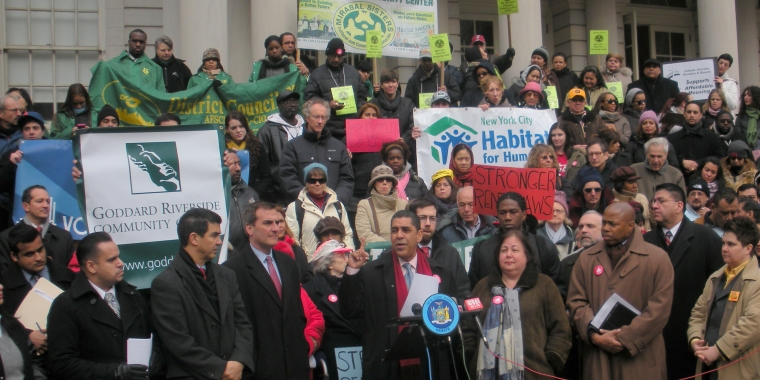
Sen. Espaillat Announces Introduction of Bill to Extend Rent Control, Strengthening Tenant Protections
Adriano Espaillat
February 13, 2011
-
ISSUE:
- Housing

Call on Developers’ Tax Credit to be Linked with Rent Control Extension
Rent Laws that Impact Over 1 Million Homes in New York City and the Surrounding Counties Must Be Renewed to Protect Tenants from Harassment and Unaffordable Rent Hikes
(New York, NY) – Today, New York State Senator Adriano Espaillat announced the introduction of crucial legislation that will extend rent control for over one million New Yorkers. As ranking member of the Senate’s Housing Committee, Senator Espaillat has vowed to link any extension of the 421A real estate tax credit – a boon for developers in New York City – with the extension of rent control for poor and working class tenants.
“New York City, as we know it, will cease to exist if rent regulations are not extended and millions of tenants are forced out of their homes,” said Sen. Espaillat. “To protect the fabric of New York, we must immediately extend rent control and protect tenants from harassment and abuse.”
“If rent protections for working class tenants are not extended, we will fight tooth and nail to block the 421-A tax credit from being extended for wealthy developers,” said Sen. Espaillat.
Over the last two decades when the rent laws have come up for renewal, they have been severely weakened to increase profits for landlords. The laws governing rent regulation expire on June 15, 2011.
Senator Espaillat has introduced legislation (S.2783) which will renew and strengthen these laws. A similar bill (A. 2674A) exists in the Assembly.
The following are some key components of the legislation (S. 2783):
Repeals vacancy destabilization and re-regulates most of the apartments that have been lost through this loophole in the last two decades,
- Allows New York City and suburban municipalities to bring former Mitchell-Lama and Section 8 buildings under rent stabilization,
- Reduces the statutory vacancy bonus from 20% to 10%,
- Reforms preferential rent loophole that enables landlords to increase stabilized rents by hundreds of dollars when tenants renew their leases,
- Reforms the provision that allows landlords to empty entire buildings by claiming they need more than one unit for themselves or their family members,
- Reforms the Major Capital Improvement (MCI) program by making rent surcharges temporary and which end when the landlord has recovered the cost of the improvement,
- Reforms the Individual Apartment Improvement (IAI) program by reducing the monthly rent increase from 1/40th to 1/60th of the cost of the improvement,
- Repeals the Urstadt Law which will restore home rule powers over rent and eviction legislation to the City of New York.
"More than a million New Yorkers depend on rent regulations to keep them in their homes, and New York's neighborhoods depend on the stability that our affordable housing laws provide,” said State Senator Daniel Squadron. “We absolutely must renew our rent laws and improve them by ending vacancy decontrol, reforming the individual apartment increase program and preventing the abuse of owner occupancy 'personal use' evictions. I will work with Senator Espaillat, Senator Krueger and my other colleagues to ensure that we protect tenants throughout New York."
New York City and the surrounding counties face an acute shortage of affordable housing. Since the state’s passage of laws to weaken the rent regulations – vacancy decontrol, automatic vacancy increases, and preferential rent amendments – landlords have been given an incentive to harass tenants or commit massive fraud to create vacant apartments that can be deregulated with higher rents. Between 1994 and 2010, it is estimated that over 300,000 units of affordable housing were removed from rent regulation.
According to the state’s housing agency which supervises the rent regulation system, vacancy decontrol is the primary cause of deregulation. The NY Homes and Community Renewal agency reports that since 2003, the last time the laws were renewed, at least 73,000 affordable apartments have been lost under the provisions of vacancy decontrol. Because the rent laws do not require owners to seek approval or to even notify the agency when an apartment is removed from regulation through vacancy decontrol, that figure is likely much higher.
The current loopholes in the rent regulation system, specifically vacancy decontrol, provide economic incentives for landlords to pay speculative prices for rent regulated properties, harass tenants, and file fraudulent rent increases. These practices not only undermine the city’s affordable housing stock, it also de-stabilizes working class neighborhoods across the city.
Renewing and strengthening the rent regulations will stabilize this affordable housing stock and ensure that working and middle class families have the protections to stay in their homes and neighborhoods.
Share this Article or Press Release
Newsroom
Go to NewsroomPols Seek Answers in Housing Crime Rise
March 8, 2011
